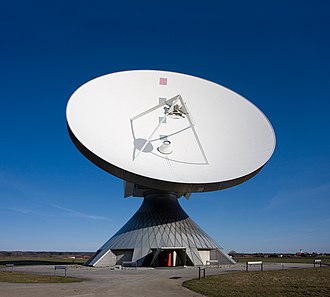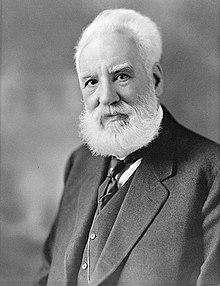Portal:Telecommunication
The Telecommunication Portal

Telecommunication, often used in its plural form, is the transmission of information with an immediacy comparable to face-to-face communication. As such, slow communications technologies like postal mail and pneumatic tubes are excluded from the definition. Many transmission media have been used for telecommunications throughout history, from smoke signals, beacons, semaphore telegraphs, signal flags, and optical heliographs to wires and empty space made to carry electromagnetic signals. These paths of transmission may be divided into communication channels for multiplexing, allowing for a single medium to transmit several concurrent communication sessions. Several methods of long-distance communication before the modern era used sounds like coded drumbeats, the blowing of horns, and whistles. Long-distance technologies invented during the 20th and 21st centuries generally use electric power, and include the telegraph, telephone, television, and radio.
Early telecommunication networks used metal wires as the medium for transmitting signals. These networks were used for telegraphy and telephony for many decades. In the first decade of the 20th century, a revolution in wireless communication began with breakthroughs including those made in radio communications by Guglielmo Marconi, who won the 1909 Nobel Prize in Physics. Other early pioneers in electrical and electronic telecommunications include co-inventors of the telegraph Charles Wheatstone and Samuel Morse, numerous inventors and developers of the telephone including Antonio Meucci and Alexander Graham Bell, inventors of radio Edwin Armstrong and Lee de Forest, as well as inventors of television like Vladimir K. Zworykin, John Logie Baird and Philo Farnsworth.
Since the 1960s, the proliferation of digital technologies has meant that voice communications have gradually been supplemented by data. The physical limitations of metallic media prompted the development of optical fibre. The Internet, a technology independent of any given medium, has provided global access to services for individual users and further reduced location and time limitations on communications. (Full article...)
Selected article -
India's telecommunication network is the second largest in the world by number of telephone users (both fixed and mobile phones) with over 1.1 billion subscribers as of December 2023. It has one of the lowest call tariffs in the world enabled by multiple large-scale telecom operators and the ensuant hyper-competition between them. India has the world's second-largest Internet user-base with over 904 million broadband internet subscribers as of December 2023.
Major sectors of the Indian telecommunication industry are the telephone, internet and television broadcast industries in the country which are involved in an ongoing process of developing into a next-generation network, increasingly employing an extensive array of modern network infrastructure such as digital telephone exchanges, network switching subsystems, media gateways and signaling gateways at the core, interconnected by a wide variety of transmission systems using optical fiber or microwave radio relay networks. The access network, which connects the subscriber to the core, is highly diversified with different copper-pair, optical fiber and wireless technologies. Satellite television, a relatively new broadcasting technology has attained significant popularity in the Television segment. The introduction of private FM has boosted radio broadcasting in India. Telecommunication in India has been greatly supported by the Indian National Satellite System system of the country, one of the largest domestic satellite systems in the world. India possesses a diversified communications system, which links all parts of the country by telephone, Internet, radio, television and satellite. (Full article...)General images
Things to do
 |
Here are some tasks awaiting attention:
|
Selected biography -
Alexander Graham Bell (/ˈɡreɪ.əm/, born Alexander Bell; March 3, 1847 – August 2, 1922) was a Scottish-born Canadian-American inventor, scientist and engineer who is credited with patenting the first practical telephone. He also co-founded the American Telephone and Telegraph Company (AT&T) in 1885.
Bell's father, grandfather, and brother had all been associated with work on elocution and speech, and both his mother and wife were deaf; profoundly influencing Bell's life's work. His research on hearing and speech further led him to experiment with hearing devices which eventually culminated in Bell being awarded the first U.S. patent for the telephone, on March 7, 1876. Bell considered his invention an intrusion on his real work as a scientist and refused to have a telephone in his study. (Full article...)Did you know (auto-generated) -

- ... that Angelito de Canal 13, the mascot of the Chilean television network Canal 13, was inspired by its creator's son?
- ... that Pierre Kaufmann helped install the first radio telescope in Brazil, which was later destroyed by cows?
- ... that the limited radio airplay of "Get Together" in the US spawned a petition, outrage, and conspiracy theories among Madonna fans?
- ... that although the Germans boasted that they captured British radio traffic with ease, the Wireless Set Number 10 was so secure that they never even knew of its existence?
- ... that one owner of Montana radio station KXGF went from owning a stake in a waterbed dealership to liquidating his assets in a span of six months?
- ... that Ernst Jacobi, known for portraying Gauleiter Löbsack in Volker Schlöndorff's film The Tin Drum, played more than 200 roles as a television actor?
Related portals
Topics
Subcategories
Associated Wikimedia
The following Wikimedia Foundation sister projects provide more on this subject:
-
Commons
Free media repository -
Wikibooks
Free textbooks and manuals -
Wikidata
Free knowledge base -
Wikinews
Free-content news -
Wikiquote
Collection of quotations -
Wikisource
Free-content library -
Wikiversity
Free learning tools -
Wiktionary
Dictionary and thesaurus




























































































